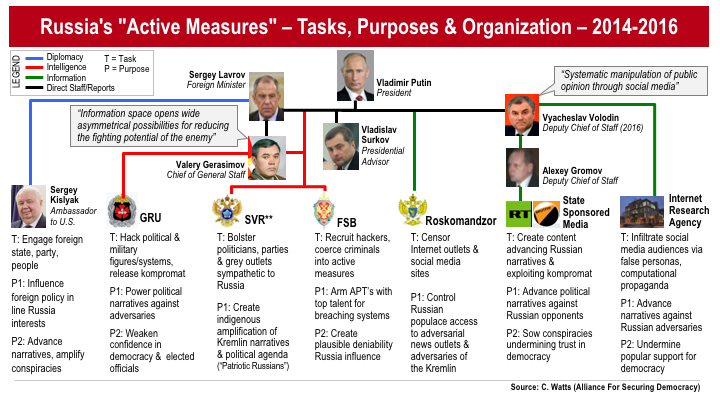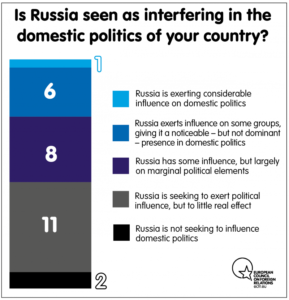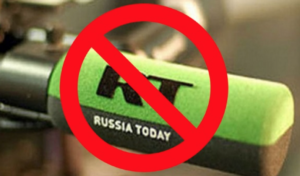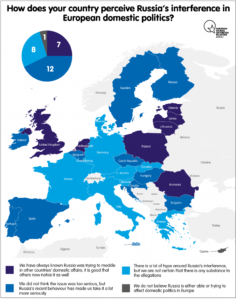
Clint Watts/Alliance for Securing Democracy
Is Russia succeeding in destroying American democracy, as one Washington Post columnist suggests?
Much of the global conversation around “fake news” has centered on the United States. Yet it increasingly seems that actions in the European Union may have a more lasting effect on the misinformation ecosystem, notes Poynter, a partner of the National Endowment for Democracy.
The European Union and Russia are locked in an open battle over the norms of international conduct – a clash between liberal universalism and authoritarian statism; the liberal international order and realpolitik, according to a new analysis.
 Russia’s interference in European internal affairs is one front line in this normative battle – Moscow’s attempt to erode the Western liberal consensus from within, argues Kadri Liik, a Senior Policy Fellow at the European Council on Foreign Relations:
Russia’s interference in European internal affairs is one front line in this normative battle – Moscow’s attempt to erode the Western liberal consensus from within, argues Kadri Liik, a Senior Policy Fellow at the European Council on Foreign Relations:
- Russia supports anti-establishment forces in Europe because it lacks friends among establishments. Its use of unconventional methods is not a demonstration of creative strategy but an attempt to compensate for deficiencies.
- EU member states are remarkably united in their assessment of Russia, but they still need to translate this unity into a political strategy that reflects not just European values, but also Russian realities.
- The path to winning the overall normative war will not go so much through countering Russia as through improving Europe’s resilience and reinvigorating the Western model.
 In contrast to the West, Russia does not see information warfare as a separate or even a secondary effort in pursuit of its foreign policy goals. Instead, active measures, defeating adversaries through the “force of politics rather than the politics of force,” guide the Kremlin’s strategic approach to defeating the West, writes Clint Watts, a Non-Resident Fellow at the Alliance for Securing Democracy. The entirety of Russia’s government understands and participates in this mindset, but he highlights six key elements that give them a decisive edge over their adversaries on the information battlefield.
In contrast to the West, Russia does not see information warfare as a separate or even a secondary effort in pursuit of its foreign policy goals. Instead, active measures, defeating adversaries through the “force of politics rather than the politics of force,” guide the Kremlin’s strategic approach to defeating the West, writes Clint Watts, a Non-Resident Fellow at the Alliance for Securing Democracy. The entirety of Russia’s government understands and participates in this mindset, but he highlights six key elements that give them a decisive edge over their adversaries on the information battlefield.
- Roskomnadzor: Before undertaking the offensive on social media, Russia smartly installed an effective defense. Roskomnadzor, Russia’s Federal Service for Supervision of Communications, Information Technology, and Mass Media, systematically instituted controls to censor adversarial content outlets on the Internet, creating the most vast and effective social media monitoring system in the world. …
 State Sponsored Media – RT, Sputnik News, and Many Others: Russia’s numerous state sponsored media outlets, namely their RT television outlets and Sputnik News wire services,[1] create a constant bubble of Kremlin narratives worldwide to connect with and rally Russian populations abroad, and enlist allies amongst foreign audiences. …
State Sponsored Media – RT, Sputnik News, and Many Others: Russia’s numerous state sponsored media outlets, namely their RT television outlets and Sputnik News wire services,[1] create a constant bubble of Kremlin narratives worldwide to connect with and rally Russian populations abroad, and enlist allies amongst foreign audiences. …- Internet Research Agency (IRA): Russia’s disinformation system succeeds by blending state sponsored propaganda with sustained social media engagement with targeted audiences via the Internet Research Agency. The IRA infiltrates audiences through false personas that look like and talk like the target audience, thus lowering normal cultural objections to foreign influence….
- Russia’s Intelligence Services remain one of the country’s greatest strengths, and their strength sustains Putin’s authoritarian grip on his own population. The Kremlin sports an array of intelligence services, but their three top bureaus orchestrate active measures at home and abroad into a seamless public relations assault. …
- Federal Security Service (FSB): Russia’s internal intelligence service garners its strength through connections to its forefathers in the Soviet KGB. Within active measures, the FSB plays several supporting active measures roles. They recruit hackers, enlisting them, directly and indirectly, in their cyber force for the pursuit of kompromat on Russian opponents at home and abroad…
 Main Intelligence Administration (GRU): Russia’s military intelligence service reached new notoriety in December 2016 when the Obama administration sanctioned them for hacking connected to the U.S. election. The GRU hacked political and military personnel and systems to gain kompromat throughout the Western elections campaign of 2014–2016….
Main Intelligence Administration (GRU): Russia’s military intelligence service reached new notoriety in December 2016 when the Obama administration sanctioned them for hacking connected to the U.S. election. The GRU hacked political and military personnel and systems to gain kompromat throughout the Western elections campaign of 2014–2016….- Foreign Intelligence Service (SVR): Russia’s foreign intelligence service provides the critical glue for active measures abroad. The SVR’s human intelligence assets connect with, recruit, and bolster witting and unwitting agents, foreign politicians, and political parties sympathetic to Putin’s regime. ….
- Russia’s Diplomatic Corps: Russia’s foreign ministries and diplomats masterfully advance the Kremlin’s active measures. Seeking to influence foreign policy, they overtly engage politicians and parties sympathetic to the Putin regime. They create engagements by which Russia’s propaganda machine can shape narratives globally by setting the agenda and advancing it first, before the other side can put forth comments on the record….RTWT
 With respect to countering fake news, the EU and its member states need to adopt a few preliminary recommendations, Liik (left) adds. They should:
With respect to countering fake news, the EU and its member states need to adopt a few preliminary recommendations, Liik (left) adds. They should:
- “Weaponise” information in reverse – that is, explain calmly and truthfully what Russia is doing without minimising or exaggerating the threat. This may help serve as an antidote to both ignorance and paranoia.
-

Credit: ECFR
Organise courses that help journalists and editors develop a critical attitude towards Russian media outlets, so that they can distinguish between biased and reputable sources of information. The latter exist and are doing a good job of exposing Russian meddling in the West, among other things.
- Agree on common European positions and policies in areas in which member states would otherwise be vulnerable to Russia. For example, many countries wonder whether they should allow RT and Sputnik to operate in their territory.
“Ultimately, the fundamental dimension of resilience is a society’s capacity to have a rational discussion that cannot be easily derailed by conspiracy theories, opportunist spin, or a lack of basic trust,” Liik contends. “This presupposes political elites that enjoy relatively high levels of trust, political institutions that are independent and credible, state finances that are transparent, media outlets that are not entirely sensationalist, minorities that are reasonably well-integrated, and historical traumas (if any) that have been thoughtfully addressed.” RTWT
 Venezuela is the latest arena for Russian interference, evident in Moscow’s full-throated embrace of Maduro’s over-the-top accusations of Washington-engineered regime change, notes Carnegie fellow Julia Gurganus. So, why does Moscow choose to back Maduro, even as Venezuela teeters on the brink of collapse? On several issues, there is a clear alignment of interests and world view:
Venezuela is the latest arena for Russian interference, evident in Moscow’s full-throated embrace of Maduro’s over-the-top accusations of Washington-engineered regime change, notes Carnegie fellow Julia Gurganus. So, why does Moscow choose to back Maduro, even as Venezuela teeters on the brink of collapse? On several issues, there is a clear alignment of interests and world view:
- Sanctions: Moscow has long opposed sanctions as a foreign policy tool, especially from the U.S., which has recently levied several waves of individual, corporate and sectoral sanctions against Russia. The U.S. stepped up pressure on Maduro this week, announcing new sanctions that prohibit the purchase of Venezuelan government debt.
- Multipolarity: Moscow chafes at U.S. global leadership, and Maduro presides over a ruined economy while looking for a financial lifeline that circumvents Western institutions and sanctions. Together, the two countries look to build alternatives, such as this year’s lackluster launch of the Petro, Venezuela’s digital currency.
- Authoritarianism: Moscow and Caracas share an aversion to genuine democratic governance, ruling by sidelining opposition candidates, enriching their inner circles at the expense of the public good and running sham elections.
- Anti-U.S. stance: In recent months, Maduro and Putin have flaunted their mutual support in the face of U.S. pressure, blaming U.S. sanctions for their economic problems and using them to whip up domestic support.
- Money: Russia’s state oil company Rosneft has been making loans to Maduro in exchange for stakes in Venezuela’s oil. As long as Maduro is in power, Rosneft’s investment looks good.
This article was originally published by Axios.
How policymakers, companies, and users can fight the growing threats of misinformation and fake news was the subject of a two-panel conversation on May 10, at Future Tense, a partnership of Slate, New America, and Arizona State University; New America’s Education Policy Program and Open Technology Institute; and the First Amendment Coalition.







